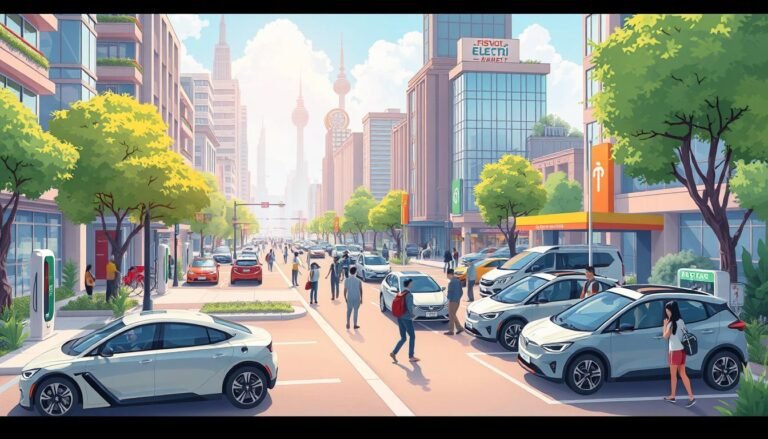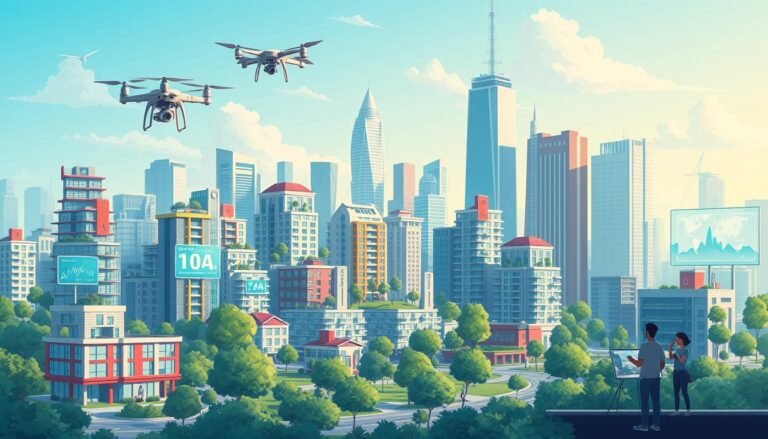Smart Cities in Ireland: Innovations and Developments
Imagine a future where cities are not just solving today’s problems but are also creating smart urban ecosystems. This vision is coming true in Ireland, especially in Dublin. It’s leading the way with new tech, green solutions, and ways to bring people together.
Picture a city where data helps make quick decisions to save energy by 33% and cut down on harmful emissions by 40% by 2030. With €800k set aside for new business ideas, Smart Dublin is making this vision a reality. They’re bringing these advanced solutions into everyday city life.
Key Takeaways
- Smart Dublin has dedicated €800k to fund five SBIR competitions.
- SBIR employs a two-phase process for feasibility and prototyping.
- Ten current challenges under SBIR focus on innovative public needs solutions.
- Smart Dublin aims to reduce greenhouse gas emissions by 40% by 2030.
- Collaboration with companies like Google and MasterCard aids in real-time data collection on urban performance.
- Shared mobility platforms like Dublinbikes, Moby, and Bleeper are increasingly popular.
- The city is expanding EV charging stations to support broader electric vehicle adoption.
Introduction to Smart Cities in Ireland
Smart cities in Ireland aim to change urban areas with technology and data. This plan makes cities more efficient and livable. Dublin, with over 1.3 million people, leads in this urban change.
The Smart Docklands project is a great example. It has over 250 participants and big names like Google and IBM. It’s been nominated for top awards and won the World Small Cell Award for its 5G work.
Another project is Smart Balbriggan, in Ireland’s youngest town. It aims to improve jobs and services, making the area sustainable. Sandyford in Dublin is also changing, with over 1,000 businesses and 25,000 jobs.
The Smart Economy project by Dublin City Council is key. It offers economic data to businesses and investors. Projects like MyDoorStep and smart bins show Dublin’s smart city efforts.
The Smart Places project covers ten areas in the West and North West of Ireland. It uses fast broadband to help schools, businesses, and communities. This supports the government’s Broadband Plan to help urban and rural areas.
The Smart People project focuses on citizen engagement. It uses social media and NLP to understand what people need. This ensures the city’s changes meet everyone’s needs.
Sustainable Urban Planning in Irish Smart Cities
In Ireland, sustainable urban planning is key to making smart cities. It uses new ideas and cares for the environment. Irish cities use smart city innovations to make cities strong and welcoming for everyone. They focus on sustainability.
Examples of Sustainable Urban Planning Initiatives
Irish smart cities show their commitment to sustainable planning through many projects:
- Green Spaces and Parks: More green spaces and parks are being added. This helps with biodiversity and gives people places to enjoy and stay healthy.
- Public Transportation Upgrades: Cities are investing in electric buses and bike-sharing. This cuts down on pollution and makes traveling greener.
- Smart Waste Management: Cities use sensors and IoT tech to make waste collection better. This makes things more efficient and less harmful to the planet.
Renewable Energy in Urban Planning
Renewable energy is a big part of sustainable planning in Irish smart cities. Here are some ways they’re using it:
- Solar Panels and Wind Turbines: Cities are using solar panels and wind turbines to make clean energy. This lessens the need for fossil fuels.
- District Heating Systems: Cities are looking into district heating. This uses heat from industries to warm homes, saving energy.
- Energy-Efficient Buildings: Buildings are being made to save energy. This includes better insulation and smart thermostats.
These projects show how smart city innovations are being used to make cities better. By focusing on renewable energy, Irish cities are improving life for everyone. They’re leading the way in making cities sustainable.
IoT Infrastructure in Ireland
The growth of smart urban centers in Ireland is built on strong IoT infrastructure. New tech has led to big steps forward, with the IoT market expected to be worth over £25 billion by 2020. This growth is seen in the number of connected devices, which will jump from 4.9 billion in 2015 to 25 billion by 2025.
At the heart of this growth is the IoT radio frequency mesh network connection. It makes sure communication is smooth and things work better. Intel is leading the charge to make Dublin an “Internet of Things city” with projects like the IoT Innovation & Development Ignition Lab.
Dublin is a hub for IoT companies, like DecaWave, which has installed 1 million IoT chips. Movidius is also a big name, powering Google’s IoT efforts with its chips. Cubic Telecom is improving connectivity with its wireless hotspots in Audi cars.
IoT touches many areas. For example, Dairymaster is changing farming with IoT tech. TSSG works with Cork’s Tyndall Institute to help IoT startups. Projects like the Litmus Technology Trialling Centre in Cork and the Sigfox network by VT Networks show Ireland’s great wireless spectrum for testing new ideas.
Big names like IBM, HP, SAP, Vodafone, Intel, Qualcomm, and SAS are all into IoT projects in Ireland. They’re making IoT a key part of these smart urban centers. The teamwork between tech giants and local innovators shows how fast Ireland’s IoT scene is growing.
Data-Driven Governance in Irish Cities
Irish cities are leading the way in using data to improve governance. This new approach focuses on strategic decision-making. It uses real-time data and ensures data privacy and security.
Real-Time Data Collection
Collecting data in real-time is key to modern governance. It helps make better decisions for public services and policies. The Empower program, backed by nearly €10 million, shows this approach well.
Empower brings together four SFI Research Centres, including Lero and Insight. They focus on data platforms and how to manage data well. Companies like Meta, Siemens, and Huawei support Empower, showing a wide range of sectors involved.
These partnerships aim to create new governance innovations. They focus on respecting user rights and bringing social benefits.
Data Privacy and Security Measures
As data grows, so does the need for strong privacy and security. Ireland’s Open Data initiative shows this, being the top-ranked in the EU for three years. The Open Data Unit, started in 2015, helps make data more accessible and innovative.
Big steps are being taken to protect data privacy and security. The Open Data Governance Board (ODGB) helps find ways to give more data access safely. This careful planning is key for ethical data use. It builds trust with citizens and encourages more use of data-driven solutions.
Smart Mobility Solutions in Ireland
Ireland is leading the way with smart mobility hubs and sustainable transportation options in its cities. Dublin, with its 2.1 million people, is a key player. It hosts the Smart City Program, now in its ninth year. This program uses new tech to improve city life.
The goal of Dublin’s Smart City program is better efficient urban mobility. It works with the public, private sectors, academia, and communities. This approach tackles city challenges with innovative tech.
Technologies like 5G, IoT, drones, AI, and digital twins are being tested. They help with mobility, sustainability, and more. For example, CurbIQ improved parking and mobility in Dublin.
The program aims to boost revenue, cut congestion, and support sustainability and fairness. This shows Dublin’s commitment to sustainable transportation options.
The Future Mobility Campus Ireland (FMCI) is another big project. It includes Jaguar Land Rover, GM, and others. Located near Shannon Airport, FMCI tests connected roadways and intersections. It aims to make roads safer and more efficient.
FMCI offers many connectivity options like 4G, 5G, and special wireless for vehicles. Through research and innovation, FMCI and Dublin’s Smart City Program are leading in efficient urban mobility. They focus on reducing traffic and promoting green living.
Energy Efficiency Initiatives in Irish Smart Cities
In Irish smart cities, energy efficiency is key to green technology and urban planning. These efforts aim to cut energy use while planning for a sustainable future. By using technology, these cities improve life quality and draw in businesses and investors.
Case Studies of Energy Efficiency Programs
Galway City stands out with its energy-saving programs, backed by the EU’s NetZeroCitiesEU Pilot Cities Programme. It got EUR 1 million to boost its energy efficiency and cut carbon emissions. The goal is to slash greenhouse gases by 51% by 2030.
Galway is also working on making buildings more energy-efficient. This move aims to lower energy use and carbon output. It’s all part of the NetZeroCities Pilot’s goals. Such projects are vital for a sustainable future and making cities more resilient against climate change.
Public and Private Sector Collaborations
The public and private sectors are working together to make these energy-saving efforts successful. Companies like Biz Guru are key in shaping Irish urban planning. Their teamwork leads to smarter energy solutions and better traffic flow, cutting down on congestion and pollution.
Galway City’s Community Climate Action Programme is another great example of this partnership. It’s backed by the Irish Department of the Environment and Galway City Council. The project gets different community groups involved in fighting climate change. This is crucial for a sustainable future and helps the city invest wisely in resources like Ireland’s waters.
These energy-saving programs, thanks to public-private partnerships, are making Irish cities smarter and more sustainable. By using technology, Irish cities are getting ready for a greener future. They’re also making life better for citizens and improving urban quality of life.
Citizen Engagement Platforms in Smart Cities
Smart Cities in Ireland are changing how people connect with their cities. They use advanced platforms for citizen engagement. This means more people can help make decisions about their cities.
These platforms use technology to let everyone’s voice be heard. This helps different groups of people have a say in their city’s future.
At the heart of this change are community-centric solutions. In areas like the environment, people, jobs, economy, and getting around, cities are finding new ways to engage citizens. For instance, digital forums and apps let people share their thoughts, vote on projects, and give feedback.
Citizens are grouped into supporters and enthusiasts. This helps city planners know how to reach out to everyone. Tools like factor analysis and cluster analysis help understand what people need and think.
With more people moving to cities, getting citizens involved is key. By 2050, cities will make up 66 percent of the population. They already produce most of a country’s GDP and emit a lot of greenhouse gases. So, it’s vital to involve citizens in solving city problems.
Initiatives like open data and real-time data collection are crucial. They help cities plan better and use technology to listen to citizens. By investing in these, Irish Smart Cities make sure every citizen has a voice in creating a better future.
Cybersecurity Measures in Irish Smart Cities
Cybersecurity is key for keeping data safe in Ireland’s smart cities. It helps protect digital systems from threats. Secure technologies are vital for this.
Importance of Cybersecurity
Cybersecurity is very important in smart cities. It keeps digital services running smoothly. Ireland is becoming a leader in cyber security, with over 7,300 jobs and a big economic impact.
Protecting digital systems is crucial to keep data safe. It also helps people trust technology in governance and services. This fits with Europe’s Digital Decade goals, focusing on safe and sustainable digital infrastructures.
Current Cybersecurity Initiatives
The Cyber Innovate program is a big step, with €7 million for cyber security innovation and entrepreneurship. It aims to make Ireland a top cyber security leader.
Irish cyber security start-ups have gotten over €129 million in investments. This shows the sector’s growth and Ireland’s focus on secure tech. The plan is to grow digital services and the workforce by 2030, with safety at the core.
The strategy includes 38 statements of intent. It focuses on better digital infrastructure and innovation in Regional Spatial and Economic Strategies (RSES). This shows a strong approach to cybersecurity in Ireland’s smart cities.
Public-Private Partnerships for Smart City Development in Ireland
In Ireland, public-private partnerships are key to making cities smarter. They help transform cities by bringing together the public sector and private companies. This teamwork leads to new ideas and growth, especially in city planning and building projects.
These partnerships offer big chances for small and medium-sized businesses to work with the government on new ideas. By working together, they create smart solutions for city problems. For example, the Dublin Docklands project showed how teamwork can attract new investments and help businesses grow.
Dublin’s commitment to public-private partnerships has really paid off. The city’s teamwork has made it a top contender for the Smart City of the Year award at the World Smart City Expo 2017. Projects backed by these partnerships tackle big city issues like air pollution and funding for infrastructure.
Only 16 percent of cities worldwide can pay for their infrastructure on their own. This shows why public-private partnerships are vital for city growth. Also, 80 percent of city dwellers face air pollution levels above what’s safe. This highlights the need for smart solutions that focus on the environment and public health.
Ireland, especially Dublin, started its smart city journey with big policy changes in the late 1980s. Public-private partnerships, along with changes in planning and more foreign investment, played big roles. The creation of the Custom House Docks Development Authority in 1986 was a turning point. It later became the Dublin Docklands Development Authority, focusing on social needs and community involvement.
Conclusion
Ireland is leading the way in digital innovation and sustainable urban living. With over half the world living in cities now, and more to come by 2050, Irish cities are setting the standard. They mix sustainable practices, IoT tech, data-driven governance, and citizen engagement to make cities better for everyone.
The smart city journey in Ireland shows how important urban resilience is, especially after COVID-19. Cities are now focusing on being adaptable and strong against future challenges. This means working on economic recovery, improving skills, and education to make cities resilient and prosperous.
Ireland is a model for others with its smart tech and city planning. The link between tech and people-focused planning is key to smart cities. With a focus on smart, resilient, and sustainable cities, Ireland keeps leading in urban innovation.
Source Links
- Smart Dublin Launches Five Innovation Challenges – All Ireland Smart Cities
- Dublin, Ireland: Optimizing its smart city remit – ThoughtLab
- Smart Dublin: Future-Proofing The Irish Capital
- All Ireland Smart Cities Forum | Smart Cities Library™
- Introduction to Smart Cities – CPLN 591
- Smart and Sustainable Cities (M.Sc. / P.Grad.Dip.) – Courses
- Smart & Sustainable Cities – Trinity Research
- 9 reasons Ireland is the natural home for the internet of things
- AT&T to Collaborate with Dublin City and IDA Ireland to Explore Smart Cities Development
- Smart Cities – Irish SME looking/exploring partnerships/ test sites to validate and improve their products and explore opportunities for collaborative ventures in the Smart Cities Market.
- Empower puts Ireland on track for data governance leadership
- Dublin’s smart solutions to urban challenges
- Future Mobility Campus Ireland accelerates innovation in smarter, safer, more sustainable transportation
- Smart City Technologies Transform Irish Urban Planning – Biz Guru
- Priority Area K: Smart Grids and Smart Cities Action Plan
- Climate Countdown: BABLE and Galway City Council Driving Change on World Climate Change Day!
- Smart cities and quality of life: a quantitative analysis of citizens’ support for smart city development
- Smart cities in the city century – Huawei Publications
- €7M Enterprise Ireland investment in MTU’s Cyber Innovate will supercharge Ireland’s Cyber Security Innovation Ecosystem
- Do Smart Cities Represent the Key to Urban Resilience? Rethinking Urban Resilience
- Smarter cities for smarter growth: How cities can optimize their systems for the talent-based economy








